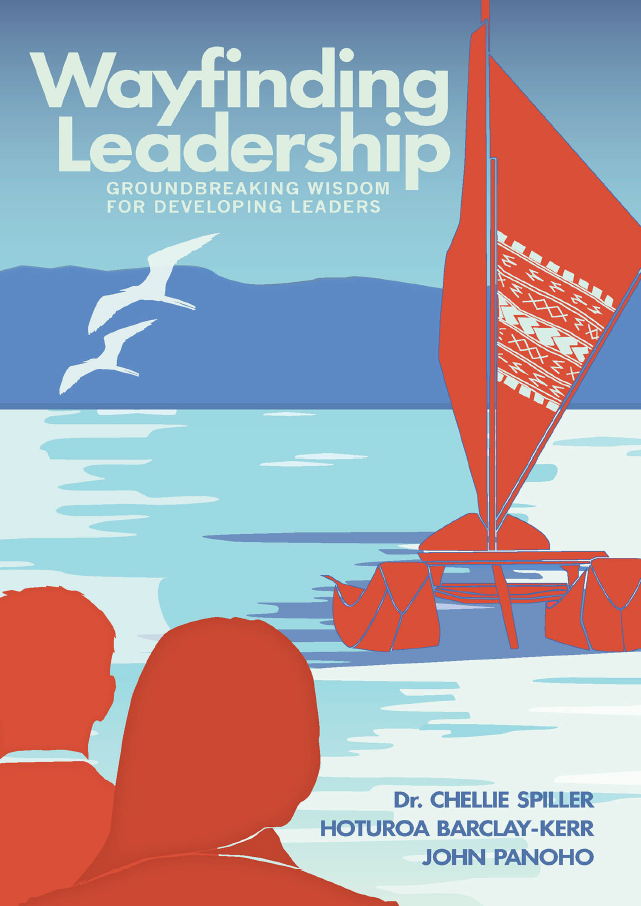Chellie Spiller
on Wayfinding Leadership
“Close your eyes to see more clearly!” said Master Navigator Pius “Mau” Piailug.
Being a Wayfinder means being fierce, seeing the whole, going beyond the known and venturing into new horizons: “Wayfinders use their whole body as a perceptive instrument, attuning to the changing and often seemingly imperceptible signs of nature. They move with purposeful stillness and know the world around them as they know themselves. Theirs is a highly disciplined way based on using all of their senses and different types of intelligence to truly ‘see’ what is going on.”
Chellie Spiller believes the true gift of wayfinding is not arriving at the destination but it’s who you become along the way. So what can modern leaders learn from Polynesian navigators?
It is all about “reading the stars”. Chellie helps leaders to be more responsive to subtle shifts and nuances, where learning becomes a way of life. She is a TED Speaker and Professor of Leadership at The University of Waikato Management School, researching how wayfinding leadership can create authenticity, sustainable wealth and well-being. As a Leader in Residence at the Atlantic Institute of the University of Oxford, she released The Catalyst’s Way, a handbook for change makers and companion guide for foundational storytellers to ignite and support catalytic efforts worldwide.
The book she co-authored with Hoturoa Barclay-Kerr and John Panoho, Wayfinding Leadership: Groundbreaking Wisdom for Developing Leaders, aims to help organisations thrive through the wayfinders’ philosophy of being: “Everybody can be a wayfinding leader. Though some of us might not consider ourselves as ‘leaders’ in any formal sense, the reality is that we are all called to lead regularly and with some frequency in our family, in our communities, and our work.”
Wayfinders have more than cerebral intellect alone. Chellie believes that apart from the impressive mental maps and logic, they draw knowledge from many sources: “Their wisdom is physical and embodied, where senses are a portal to deeper bodily knowing. They trust the knowing in their gut. To cultivate presence and stillness they tap into spiritual guidance by drawing upon ancestral wisdom. They have creative intelligence and tune into the rhythmic patterns in the world around them.”
In modern leadership, wayfinders are guided by what can be called a philosophy of recognition. Among the key principles, Chellie mentions “the leader’s ability to cultivate the potential of the people in the waka, the capacity to shed old skins and continuously refresh the thinking, mindful presence, emotional self-awareness and response-ability.”
Read Chellie Spiller’s answers for Inspirators to discover the magic of wayfinding and the five waypoints that help you gently navigate your leadership journey!
Thank you, Chellie, for being a Wayfinder!
#INSPIRATORS QUESTIONNAIRE
Name: Chellie Spiller
Company / Institution: University of Waikato
Title: Professor of Leadership
Website: www.chelliespiller.com
LinkedIn profile: https://nz.linkedin.com/in/chellie-spiller-60186a4
Country of origin: Aotearoa New Zealand
Country you currently live in: Aotearoa New Zealand
Your definition of Regeneration: To help the planet heal means also to heal ourselves and confront the ways in which we have become disconnected in this world.
In a Māori outlook, every aspect of creation possesses a whakapapa, a genealogy which traces to a shared source, a point of coalescence, which in my tribal tradition we call IO. This point of coalescence signifies human kinship with all of creation, whereby everything is connected as a totality.
Regeneration, from a Māori standpoint, cultivates symbiotic exchange and reciprocity, an abiding relationship with place and community, and deep faith in the wisdom transmitted from one generation to the next. Regeneration means asking: 'What kind of ancestor will I be?'
Main business challenge you face: I lead a transdisciplinary research team focused on Māori economies, particularly on whānau (Māori families). Māori have exceptional principles and protocols based on relationships of respect and reciprocity that guide activities such as business and trade. However, the wider constitutional, neoliberal, and legal framework keeps undermining and even attacking Māori ways of doing things.
The trait you are most proud of in yourself: Kindness.
The trait you most value in others: Kindness.
Passions & little things that bring you joy: This year, I have been doing immersion Māori language classes every day. I'm passionate about our language. I get great joy from being in nature – it replenishes me spiritually, physically and mentally. Walking on the beach with my husband Rodger, sitting with rocks, looking at the mighty Pohutukawa tree outside my window and spotting the fat kereru wood pigeons brings me joy. I enjoy chatting with my Mum, who lives with us. Writing. Reading. Reflective moments. Connecting with family and friends. Facilitating Wayfinding Leadership workshops. As I write this, I connect to my life's abundance of passions and joy!
The Inspirators who determined you to take the regenerative path:
I live with them!
My husband, Rodger Spiller. He has helped pioneer socially responsible investment in New Zealand and has been in the vanguard of change for decades.
My mother, Monica Stockdale, is an incredible Inspirator; she has worked in the field of Māori health service, for which she received an ONZM.
Both embody fierce grace – a beautiful, spiritual and unwavering commitment to making this world better.
A starting point for companies or professionals that are beginning the regeneration journey:
A piece I wrote in a short article called I AM: Indigenous Consciousness for Authenticity and Leadership comes to mind: “I AM ecological consciousness is not the easy route. It requires leaders to go beyond the ruts of the daily grind and grooves of the self and hold an expansive, healing and connective vision for humanity. More than ever, the planet needs leaders who are bravely steeped in the I AM – people who can dissolve dichotomies such as inner – outer and internality – externality and take themselves and others on the path of reunification, guided not just by a moral code of conduct but also an abiding sense of earth justice.”
Most used and abused clichés in sustainability that bother you: Check-box SDG reporting that is a whack-a-mole fixing of environmental and social issues as they pop up, rather than addressing the systemic connective tissue between things.
An honest piece of advice for young people who lose hope: You are the living face of brave wayfinders who knew how to live well in this world. It is deep within your DNA.
E kore au e ngaro, he kākano i ruia mai i Rangiātea - I will never be lost, I am a seed descended from Rangiātea. You are a divine seed borne of greatness.
Books that had a great impact on you / Must-Reads for any regenerative professional:
The Woven Universe by Māori Marsden, who was a tohunga, scholar, writer, healer, minister and philosopher. He and his wife, Whaea Jane, were dear friends of my grandmother Wikitoria Puhake Te Taite. Māori Marsden introduced my parents and encouraged my father to undertake theological studies. The Woven Universe has been a steadfast guide for me over the years.
Wayfinding Leadership. I wrote this book with John Panoho and Hoturoa Barclay Kerr. Based on the art of traditional Polynesian navigation, wayfinding leadership shows how wayfinding can transform leaders and organisations by using new practices such as mindfulness and awareness of their environment. Central to the wayfinding approach is seeing what is going on by reading the signs, discerning the details and seeing the whole. Wayfinders go beyond the known and journey on voyages of discovery to new horizons.
Movies / Documentaries you would watch all over again: Whale Rider.
Websites / Podcasts you visit frequently: I have been immersed in Māori language podcasts such as Taringa this year.
Music that makes you (and your heart) sing: Stan Walker’s I AM and also He Kakano Ahau, which I mentioned above. Mum and I have had his songs on repeat play recently and have been singing them around the house.
Places you travelled to that left a mark on you: Visiting Indigenous homelands. Raiatea in Tahiti was an exceptional visit. This land of New Zealand is so precious and magnificent. To go home to my tribal area on the east coast, to hike in the forests, swim in the ocean, meander in pastures, and discover the many incredible places in New Zealand is a joy and blessing.
Global Regenerative Voices you recommend us to follow:
I had the honour of being a leader-in-residence at the Atlantic Institute based at Oxford University a couple of years ago. As part of that role, I had the enormous pleasure of working with a group of catalysts who embody Global Regenerative Voices. I wrote The Catalysts Way and a separate Storytellers Companion Guide that you can read for free, thanks to the generosity of the Atlantic Institute.
Trends in Regeneration we should keep an eye on: There is a vast body of work by Indigenous leadership across multiple disciplines. Take time to read and dwell on these works.
Events we should attend / Best places for networking (online or offline): Engage with what is happening in Indigenous communities in your area by attending events, going to exhibitions and theatre, and watching Indigenous documentaries and movies.
Impactful and relevant Sustainable Development or Regeneration courses or certifications: For me, the most impactful and relevant events are the ones that are in communities and often are gatherings where transmission is delivered orally and not for certification purposes. However, that said, Indigenous schools and universities offer excellent courses in traditional medicine, language, culture and performance arts. So there are offerings like these in other nations as well.
Reasons to feel optimistic about our future in 2030: Our rangatahi (young people). I’m so blown away by their courage, cultural groundedness, talent and vision.
Reasons to feel pessimistic about our future in 2030: There are many reasons to be deeply concerned, but I'm not pessimistic because I believe in the power of activated hope to turn things around.
Regenerative Leadership qualities much needed today: Listening.
The Inspirator(s) you are endorsing for a future edition:
Rodger Spiller
The quote that inspires you:
“Don’t pray for fair weather, pray for courage!” (Master Oceanic Navigator Mau Pialiug)





